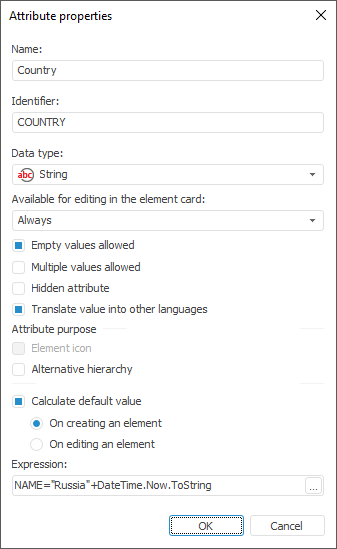 To open the dialog box
To open the dialog boxThe Attribute Properties dialog box opens when a standard attribute is created or edited:

NOTE. System attributes do not allow editing some settings.
Set the following parameters in the Attribute Properties dialog box:
Name. Enter attribute name.
Identifier. Enter unique attribute identifier. Only English letters, numbers and underscores are allowed; spaces are not allowed.
Data Type. To determine a type of data, select one of the values in the drop-down list:
DateTime.
String.
Integer.
Real.
Date.
Logical.
Long text.
NOTE. Attributes of the Long Text type enable the use of a text string containing over 4000 characters.
Available for Editing in the Element Card. Use the drop-down list to select, when attribute value is available for edit in the element card:
Always. Attribute value can always be edited in the element card.
If Visible. It is used by default. Attribute value can be edited in the element card if the attribute is not hidden.
Never. Attribute value cannot be edited in the element card. Regardless of the state of the Hidden Attribute checkbox, the Null Values Allowed checkbox is selected and disabled.
Empty Values Allowed. The checkbox is selected by default. If the checkbox is deselected, each dictionary element must have the value of this attribute. Otherwise this attribute is optional. This option is available if the attribute is not hidden.
Multiple Values Allowed. The checkbox is deselected by default. If the checkbox is selected for the dictionary element, several values of this attribute can be set. The set of values of this attribute is displayed in a row separated by semicolons. To select several attribute values, the user can set a link by this attribute with the other dictionary containing values. When working with data analysis and report building tools data can be saved to dictionaries with attribute values if this dictionary is specified as a data source and cube dimension, based on which various reports are built.
NOTE. If the Multiple Values Allowed checkbox is selected, the Alternative Hierarchy checkbox must be deselected because these checkboxes cannot be selected at the same time.
Hidden Attribute. When the checkbox is selected, the attribute is used in dictionary creation but is not displayed in the dictionary. The checkbox is available if the attribute may have empty value. Hidden attributes are highlighted in grey on the Attributes tab.
Translate Value into Other Languages. The checkbox is selected by default. Selecting the checkbox enables the user to create a multilingual MDM dictionary. It stores names of all attributes and values of string attributes both for the current language and for the languages, into which this dictionary needs to be used.
NOTE. The checkbox is available only for attributes of the String and the Long Text type if the Translate Dictionary into Other Languages checkbox is selected on the Description tab.
Element Icon. When the checkbox is selected, attribute value determines index of the icon for dictionary element. The checkbox is available if the object is set for repository that contains dimension element icons. If this attribute is selected, an icon index of which matches the value of this attribute, is displayed next to elements names. This checkbox is available only for integer attributes.
Alternative Hierarchy. The checkbox is deselected by default. When the checkbox is selected, the attribute is used to set up alternative hierarchy of MDM dictionary.
NOTE. If the Alternative Hierarchy checkbox is selected, the Multiple Values Allowed checkbox must be selected because these checkboxes cannot be selected at the same time.
Calculate Default Value. The checkbox is deselected by default. Set a fixed value or a Fore expression as a default value, using expression editor. Determine when the value is calculated: once on creating an element or every time the element is changed.
The Attribute Properties dialog box enables the user to edit only the name and attribute type of system attributes.
See also: